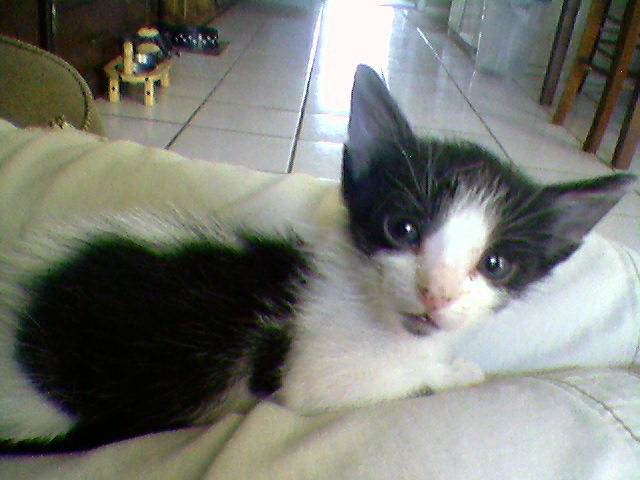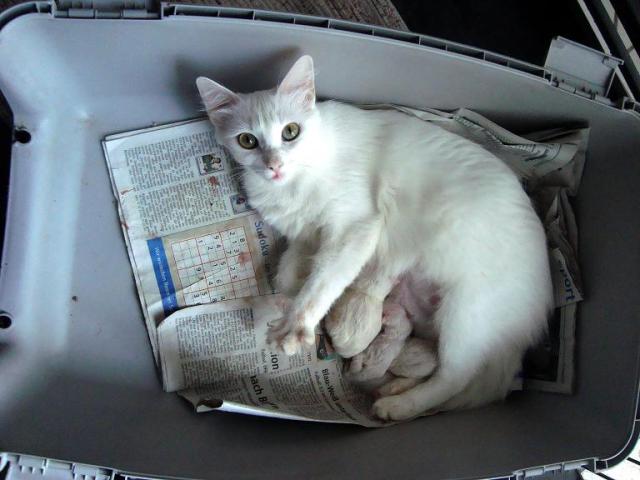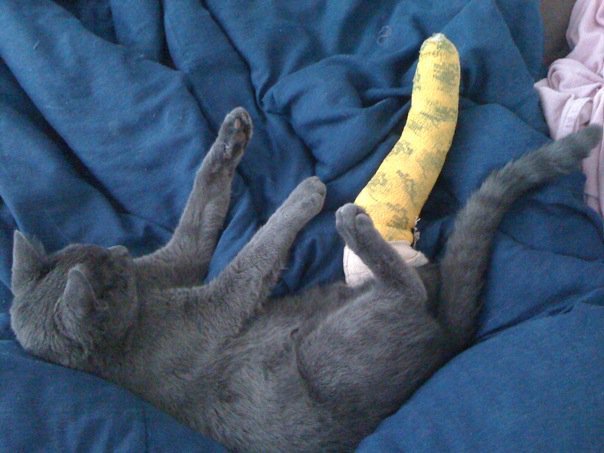QuestionMy female cat I thought got pregnant before I got the ,ale fixed... It has been over 11 weeks since he has been neutered and she has not given birth. Now if she does have kittens that died inside the womb would she still deliver them? she looks good, nice healthy coat, very alert and playful and affectionate......plus I think she went into haeat a few days back
AnswerDonna,
The only way to know for sure whether or not your queen is pregnant would be to take her to the vet for a complete physical examination, if the vet feels that it's warranted s/he'll recommend an ultrasound or x-rays to confirm pregnancy and estimated fetal age. The gestation period for cats is normally between 60-68 days though most queens average 63 days. If this kitty does have deceased kittens in her womb she would start to show some symptoms within several days to a week with most cats showing symptoms as early as 12-24 hours after the kittens were meant to be born. If your female kitty is younger and this is a first litter there is the possibility of obstetric problems - you just never know how any given cat is going to react to pregnancy, labor or delivery and if a big kitten gets stuck in the birth canal it can act like a cork preventing others from being born. If your suspicion about your queen going into season a few days ago is correct there's no way that she's pregnant, expectant moms don't go into season because they're already pregnant.
There is an incredibly serious pet overpopulation issue that affect shelters and rescue organizations. Unfortunately many animal loving staff working for animal welfare organizations are forced to euthanize healthy, adoptable animals simply because they don't have the time, space or resources to devote to each animal until their forever family comes along to adopt them. The euthanasia rate for cats tends to be much higher than that of dogs, possibly because cats are seen as disposable or simply because pet parents aren't taking the simply step of controlling pet overpopulation by spaying/neutering their cats.
There are many good behavioral and medical reasons to spay/neuter our cats. Cats that have been spayed/neutered are prevented from getting uterine, ovarian or prostate cancers. The earlier in life that a cat is spayed/neutered the less likely s/he will be to develop prostate or breast cancers. Unspayed female cats are at risk of developing a potentially life threatening uterine infection called pyometra which causes the womb to fill with pus, if the uterus ruptures and spreads infection throughout the abdomen the cat's chances of survival are pretty low. The only treatment for pyometra is to perform an emergency spay, this procedure is much riskier than a routine spay because the cat is already quite sick which is associated with higher risks of anesthetic death and post surgical complications. The emergency spay is more complicated and time consuming so it tends to be quite a bit more expensive than a routine spay. Many parents believe that the best way for their children to learn about the miracle of birth is to watch the family pet give birth, I strongly advise against that since so many unwanted pets are destroyed every year in shelters. If you do want your children to see a cat (dog or other domestic pet) give birth there are videos on youtube that will show your children the birth process without having the additional burden of finding permanent, responsible homes for accidental litters of kittens.
The leading cause of death in cats living in North America is euthanasia secondary to behavioral issues. This statistic is heart breaking because many behavioral issues can be prevented through appropriate training or minimized by spaying/neutering our cats. Common behavioral problems including inappropriate elimination (urinating or defecating outside of the litter box), fighting with other cats (the resulting injuries from cat fights often require medical care because bite wounds tend to get badly infected forming abscesses which must be drained under anesthetic, flushed with sterile saline and treated with antibiotics), queens howling to advertise their availability to mate, tom cats caterwauling and fighting to win the right to mate with receptive queens and wandering over a large area are all issues which can be prevented by having the cat spayed/neutered before they reach sexual maturity. Behaviors like house soiling or fighting can sometimes occur with cats that have been spayed/neutered however these behaviors are often related to things like improper introductions to new cats in the household, poor litter box hygiene, scented litter, and other issues which can be easily solved.
Ultimately spaying and neutering our cats is a responsible and ethical choice which saves countless lives each year. For pet parents that are having difficulty getting the money together for routine vet care I may be able to help find a solution to those issues. I keep an ever growing list of resources that may be willing to cover part or all of the cost of routine care like kitten vaccines and spay/neuter procedures. The only information that I ask for in these cases is that the pet parent provide the general area they are writing from - in Canada or the US the province or state is fine. Spaying and neutering helps cats to live longer, healthier lives and as kitty caregivers that love our pets we all want to have as much quality time as possible with our furry friends.

 Orphan Kitten Care
Question
My new baby
Hello! Okay, Ill try to sho
Orphan Kitten Care
Question
My new baby
Hello! Okay, Ill try to sho
 Feline Nutrition
QuestionQUESTION: I also rescue feral cats and kittens
Feline Nutrition
QuestionQUESTION: I also rescue feral cats and kittens
 Cats broken leg and aggression
Question
Little Scout
Hello, I wanted to pose a query t
Cats broken leg and aggression
Question
Little Scout
Hello, I wanted to pose a query t
 Recently Adopted Cat
Question
CREAM PUFF
Hello !
Hoping all is well.
Recently Adopted Cat
Question
CREAM PUFF
Hello !
Hoping all is well.
 handling my 9 week ferel kitten
QuestionMillie
QUESTION: Hi. My lovely 9 week ki
handling my 9 week ferel kitten
QuestionMillie
QUESTION: Hi. My lovely 9 week ki